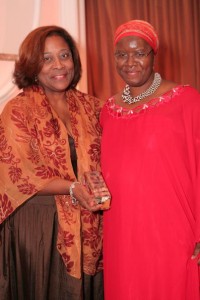
Nyaradzayi Gumbonzvanda (right) attends the 2008 Benefactrix Ball presented by YMCA at the Beverly Hills Hotel (Photo Credit: Leon Bennett/WireImage).
As we reflected on 50 Days of Action for Women and Girls and its themes, including early marriage, violence against women, and sexual and reproductive health, we got to wondering: What does all this integrated human rights talk look like in practice?
So we turned to a woman who walks the talk and leads change herself, Nyaradzayi Gumbonzvanda. Take a look at her examples of women’s participation in claiming their own rights. Then take action on an issue important to you, and join us on Facebook and Twitter to stay connected. (Don’t forget to join the World YWCA’s efforts, too!)
In your experience, what does participation mean in the context of women’s rights in your country?
For women to participate, it [is] important that they know and are aware of their rights, have the social empowerment to engage and the space to exercise their voice. Women’s community groups, organizations and networks…have provided the platforms for such participation.
Such participation has ranged from community level actions related to services and information around such issues as HIV and health, non-formal and vocational education; economic empowerment and income generating initiatives, to the very complex and sensitive issues such as response to violence against women and constitutional reform process….[M]any women and girls continue to face challenges in accessing the benefits of existing policies, hence the importance of women’s participation and civic engagement.
A human rights framework emphasizes accurate information, education and choice as key elements of advancing women’s health rights. How might these improve women’s right to participate in family, community and politics?
The family and the community are some of the most sensitive and contested areas for women’s rights. With regards to economic rights and empowerment, one is looking at the ability of women to have access to, own and control property, including land and income. This is determined not only by the laws of the country, but also by the social customs and norms.
The same applies for issues related to accessing the basic rights to health. Many women and especially young women are not able to receive quality, relevant and age appropriate sexuality education to enable them to make informed decisions, and have the life skills to negotiate relationships. This results in either teenage pregnancies or in some cases, early marriage.
Women’s participation in politics and leadership at the national level is indeed also premised on the importance of information and social support networks….Women need more information on the rules and manifestos of the political parties; and…social support from their families. Many are hindered also by lack of economic security compared to their male counterparts. It is therefore crucial that in adopting the rights based framework, women as holders of rights must be enabled to claim their rights, and the public institutions and especially the governments must provide the necessary policy and legislative framework and environment that supports such participation.
The YWCAs in Africa such as in Zimbabwe, Zambia, Rwanda, Benin, Sierra Leone and Ethiopia and others have over the years provided safe spaces to enable and equip women to claim their rights….They have lifted the community experiences and brought their voices to such spaces such as the African Union, the UN Human Rights Council and the Commission on the Status of Women. Making the local global has been a key strategy.
What do you feel is the most important change needed in order for women’s rights to be fully realized?
This is the moment to translate the norms [established in international, regional and national human rights agreements] into practical actions that transform women’s lives, create greater opportunities and reduce the gender gaps. This will take robust financial, technical and political investments and prioritization of services, programmes, initiatives and policies that address women’s rights issues.
It also requires a continued support to women’s organizing, women’s groups, networks and organizations that continue to provide safe spaces for learning, peer support, gender responsive services and collective opportunities for advocacy. It requires a boldness to engage end the negative cultural practices such as early and forced child marriage, just as much as it also entails some long terms support to such infrastructural interventions such as roads, communications and other such services.
The African Union at its 50th anniversary stressed the vision of a prosperous Africa that is at peace with itself. This will remain elusive if women’s rights are not protected, respected and fulfilled. It means that Africa should have stable governance institutions, where peace prevails. Women must therefore be at the critical tables of decision making…The international community and governments such as the US must partner with African institutions in a positive way that builds on this vision, and enables African women and girls to be part of the global citizenship.
The US is encouraged to ratify the Convention on the Elimination of All Forms of Discrimination Against Women, and therefore maximize its voice for global dialogue on women’s rights.
Nyaradzayi Gumbonzvanda is the General Secretary of the World YWCA, whose vision statement is “a fully inclusive world where justice, peace, health, human dignity, freedom and care for the environment are promoted and sustained by women’s leadership.”